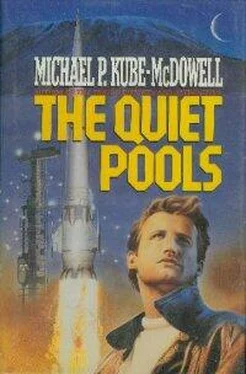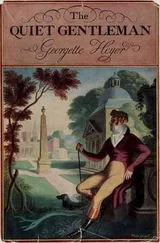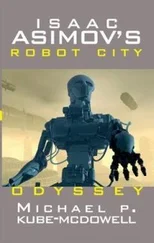“ ‘It droppeth as the gentle rain from heaven upon the place beneath. Tis mightiest in the mightiest: it becomes the throned monarch better than his crown—’ ” His voice trailed away as his memory failed him. “Must be the way you were raised.”
“I don’t understand, Christopher.”
“You’re helping him tell this joke. What’s the punch line?”
“I don’t believe these records constitute a joke, Christopher.”
“Never mind,” he said with a sigh. “Keep it coming.”
Fighting fatigue and frustration, Christopher stubbornly persisted in his task as the wee hours of morning slipped by. His eyes burned and blinked, his focus wandered. The words on the display blurred into an extended non sequitur.
The same world that seems crowded to some seems empty to others… What drives them? The ignorance of men empowered by the arrogance of gods. .. There is a bloodline of expansionism which can be traced through history, and they are its youngest, most vigorous branch… The return of sexual liberty will blunt the rush and restore the balance. Repression is the engine of ambition … Hysteresis is the enemy. We are forever responding to conditions that no longer obtain… If I can make fear a stronger force than the fantasy of freedom …
And finally he fell asleep in his father’s chair in his father’s office in his father’s house, leaving one last essay unread on the comsole display.
They pass by the windows as ghosts in a silted fog: chi-nook, silver, sockeye, steelhead. Their struggle seems to defy all reason. Once a lifetime, they fight their way upstream with a single-minded fervor we would find frightening in our own kind. They suffer the most grievous injuries, but though they may weaken, they do not falter.
Torn and bleeding, they attack the obstacle again and again, until one or the other is bested. Those which survive fight on, taking no note of those which fail—there is nothing that can be done, and still something yet to do. The next obstacle is just ahead.
And when they reach the quiet pools and spawn, the fire goes out. The fight has exhausted them. The spirit has passed from them to the eggs. Once the task is accomplished, they are content to swim in aimless circles until they die. Never, ever, do they ask, must it end this way? Such a question is beyond their capacity to conceive. This dimly apprehended call rules their being.
But I ask the question, because I have no wish to join them — or to live in the world that they will leave behind .
CHAPTER 27
—AGU—
“… I knew no fears …”
In the Creation time, said a tale Deryn once told, Coyote subdued the monster of the Columbia for the animal people. The wisest and smartest of all animals let Nashlah swallow him and then cut out the monster’s heart.
“A new race of people are coming, and they will pass up and down the river,” Coyote told the monster. “You may shake their canoes if they pass over you, but you must not kill all of them. This is to be the law always. You are no longer powerful.”
Thereafter, though the wind still blew unchecked through the river’s winding gorge, Nashlah slumbered in the deep waters. And Eagle and Beaver and Bear and Salmon came to the river without fear.
The world had changed, and animals no longer spoke like men. But in fulfillment of mythic prophecy, the once-wild Big River had been thoroughly tamed by the new race of people which came to live along its banks. The Army Corps of Engineers had finished what Coyote had begun. The river’s flagstone rapids and net-fishing falls had vanished below the surface of the lakes which formed behind the great dams. Its currents were now shaped by the needs of turbines and barges, rather than by gravity and geology.
But the salmon, Chief of the Fishes, still ran—over the concrete falls and ladders, under the barge props and jetboat hulls, through the silted, oft-polluted water. And when Christopher woke in the chair, stiff and twisted, his neck and back aching, and found his father’s chilling essay on the comsole display, he knew where he had to go.
His father had taken him to Bonneville Dam once before, a dozen years ago, to look down into the long generator bay in the north powerhouse, to marvel at the navigation lock slicing through the Oregon shore. They had spent less than an hour in the visitor center on Bradford Island, and a spare few minutes of that on the lowest level, where the fish ladder’s underwater windows and the counting room were located.
Dimly, Christopher remembered dirty water and silver fish which all looked alike to his eyes. But it seemed his father had seen something more.
To someone traveling upstream from Portland, Bradford Island appeared as a mere sliver of land, flat and forested with red and white transmission towers. It was the sole natural barrier in the string of dams and powerhouses spanning the two-and-a-half-kilometer width of the river; the smaller Cascades Island had been created when a third channel was carved out of the Washington shore.
The Corps maintained a flight control zone over the site, so Christopher was forced to merge the Avanti into the I-84 flyway and dive down with the wheelies at the Bonneville exit. A few minutes later, he was climbing out of the car in the nearly empty parking lot outside the visitor center.
“Lila, when do they open?” he said, his DBS band relaying the query.
“In half an hour, Christopher. Winter hours are ten a.m. to five p.m.”
He was not well disposed to waiting. “Damn.”
Even though the building was closed, the courtyards and walkways behind it were not. The walkways paralleled the fish ladder, the surface of which appeared as a staircase of tumbling water, passing beneath a small bridge and curving out of sight. Leaning out over the railing, he tried to peer down through the turbulent water into one of the cells. It was impossible to see anything but swirling silt and a chaos of bubbles.
His arms crossed and ungloved hands tucked in his armpits for warmth, Christopher settled on a concrete bench and waited for the silver flash, the white-foam splash of a sockeye or coho breaking water for an upstream leap. But in half an hour of watching the ladder, not once was he rewarded with that sight.
If there was life in the churning cells of the ladder, it was hidden below.
Finally, a stoop-shouldered brown-clad ranger appeared to unlock the lower-level doors behind where Christopher was seated. The ranger seemed surprised to find him waiting there.
“Morning,” he said, holding the door open as Christopher approached. “I don’t usually have company this early, ’specially not between Winterfest and the New Year. Welcome to Bradford Island—”
Christopher brushed wordlessly past him.
The lower level was much as Christopher remembered. The center of the room was filled with museum-style exhibits on the life cycle of genus Oncorhynchus . On the wall by the fish counting room, digital displays cataloged the traffic by species—day, month-to-date, and year-to-date.
But the focus of the room was the Living Theater—a row of large viewing windows which looked out into the ladder itself. Spaced across the longest wall, each window marked a bend in the ladder’s serpentine underwater path. An electronic map of the maze appeared above, its color-coded tracking lights marking the progress of several shad, three steelhead trout, and one solitary chinook salmon.
Christopher came to the railing at the window the chinook was approaching. The water rushing by beyond the glass was a soupy yellow-green, as though it were some bilious paniculate stew. A small American shad, a wriggling silver submarine, fought its way around the turn and vanished into the liquid fog. Another, darker fish squirted by, tail fins beating furiously.
Читать дальше

![Nick Cracknell - The Quiet Apocalypse [= Island Zero]](/books/28041/nick-cracknell-the-quiet-apocalypse-island-zero-thumb.webp)










